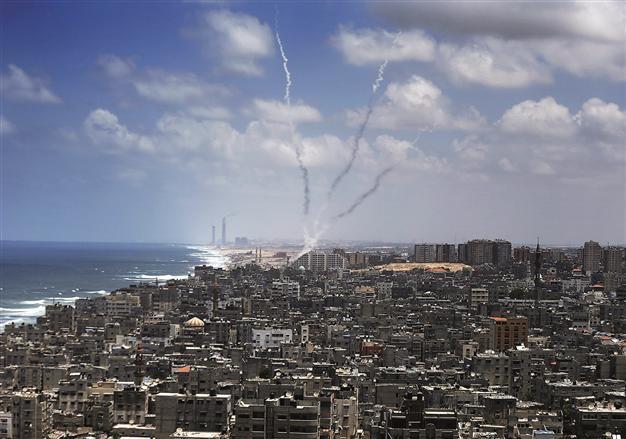What is UN good for if Gaza in flames, asks Turkish PM
ANKARA

Smokes from rockets fired from near Gaza City is seen after being launched toward the Israeli side. AFP Photo
The humanitarian tragedy in Gaza due to Israel’s devastating attacks has moved Turkish Prime Minister Recep Tayyip Erdoğan to once again slam the United Nations’ alleged lack of effectiveness.“I wonder, how can we make an explanation for what Israel has done, as a human being, no matter which religion or sect we are from?” Erdoğan said late on July 15.
“The United Nations is the number one responsible on this matter. I always ask the U.N: What do you serve for? Why was this U.N. founded? To provide the world’s peace? If the U.N. can’t fulfill its job, then it should check itself. You look at the U.N. Security Council, everything is between the lips of five countries,” Erdoğan said, speaking at a fast-breaking iftar meal hosted by his ruling Justice and Development Party (AKP) for ambassadors accredited in Ankara.
“The Prime Minister of the Republic of Turkey is surely not loved; of course he won’t be loved. Where in the world are those who tell the truth loved? But we will continue to tell the truth,” he added.
In the last few years, particularly since the beginning of the Syrian conflict, Erdoğan has grown increasingly vocal in his criticism of the U.N. for its failure to reach an agreement on how to respond to the bloody conflict in Turkey’s neighboring country.
Both Erdoğan and Foreign Minister Ahmet Davutoğlu fiercely argue in favor of a reform of the U.N. Security Council, which they describe as an unequal and unfair system that fails to reflect the will of most countries.
Still, having held one of the non-permanent seats of the council, the “Western European and Others” seat, in 2009-2010, Turkey is currently exerting intense efforts for the 2015-2016 period. The related election will be held in October.
In the same iftar speech, Erdoğan also closed the door on a potential normalization of bilateral ties with Israel under the current conditions. “In the face of such incidents, do you think Israel-Turkey relations can normalize? On the one hand you will drop 400-500 tons of bombs, you will kill defenseless people and threaten global peace, and then you will talk about ‘the normalization of relations.’ This is unacceptable to us,” he said.
Turkey tries to mediate for cease-fire
Meanwhile, Ankara has been attempting to mediate a cease-fire between Palestinian groups and Israel, with Foreign Minister Davutoğlu holding talks with his U.S. and Qatari counterparts, along with Hamas leader Khaled Mashaal and Palestinian Authority President Mahmoud Abbas.
Turkey is conducting “intense diplomacy” to reach a truce that will include “all players - Hamas and other Palestinian groups,” Davutoğlu said yesterday in a televised interview, criticizing the Israeli administration for not contacting the Palestinians over their unilateral cease-fire offer.
Citing his phone conversations with Abbas and Mashaal, Davutoğlu said the Palestinian side demanded a comprehensive “real” truce, negotiated with all parties and consisting of “elements of the 2012 deal, and the Gilad Shalit deal,” he said.
Davutoğlu noted that he had phone conversations with U.S. Secretary of State John Kerry late on July 15, during a meeting with Qatar Sheikh Tamim bin Hamad al-Thani. Davutoğlu also talked to Iranian Foreign Minister Javad Zarif.
He again urged for the opening of the Gaza port, under the monitoring of the international community, including the U.N.
“I told both Abbas and Mashaal that they should not break the unity government under any circumstances. I told them that this [Israeli campaign] was an act to destroy the unity government. They will preserve the unity government,” he stated.
Davutoğlu criticized the Europe and U.S. of taking a “pro-Israel” stance. “Europe is wary of making statements due to feelings of guilt,” he said, before also citing the influence of the “Jewish lobby in the U.S.”
He claimed that Israeli attacks on the Gaza Strip were an effort to “eliminate Hamas,” adding that “if Israel thinks it can get rid of Hamas and establish an administration closer to it, then it is mistaken.” He noted that Turkey conveyed to Israel that relations between the two countries could not be normalized if “this policy of Israel continues.”
















